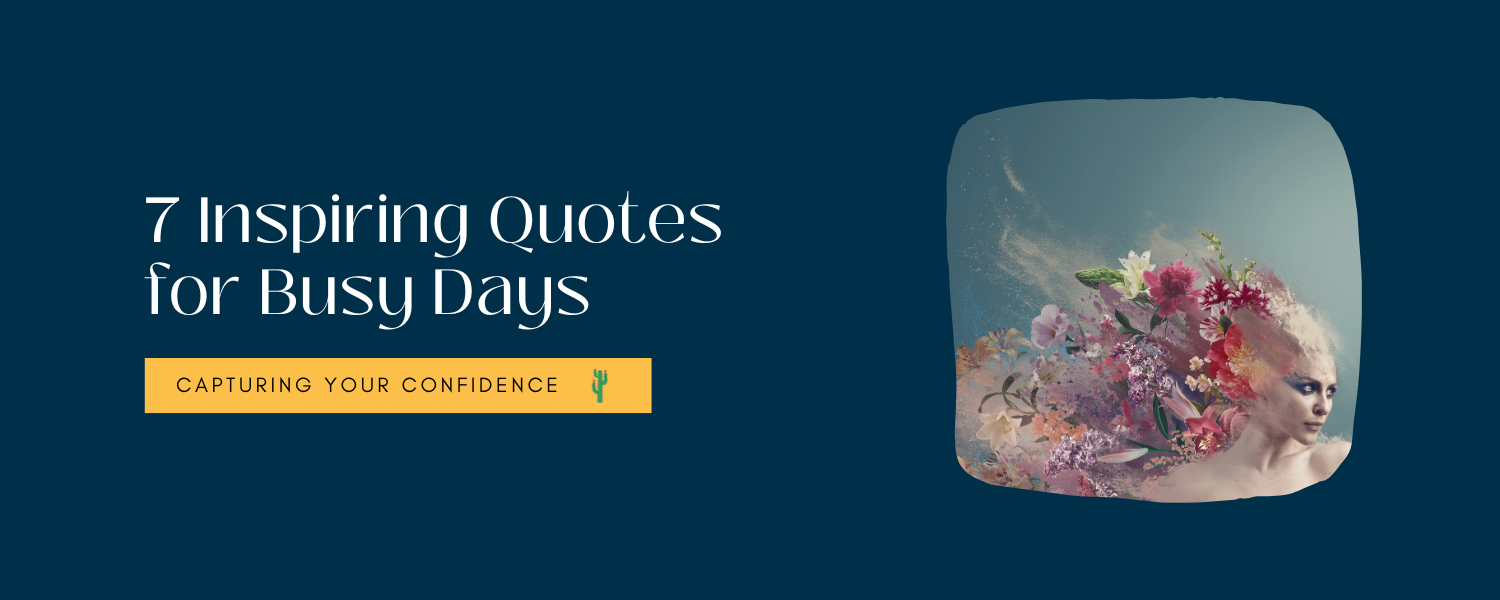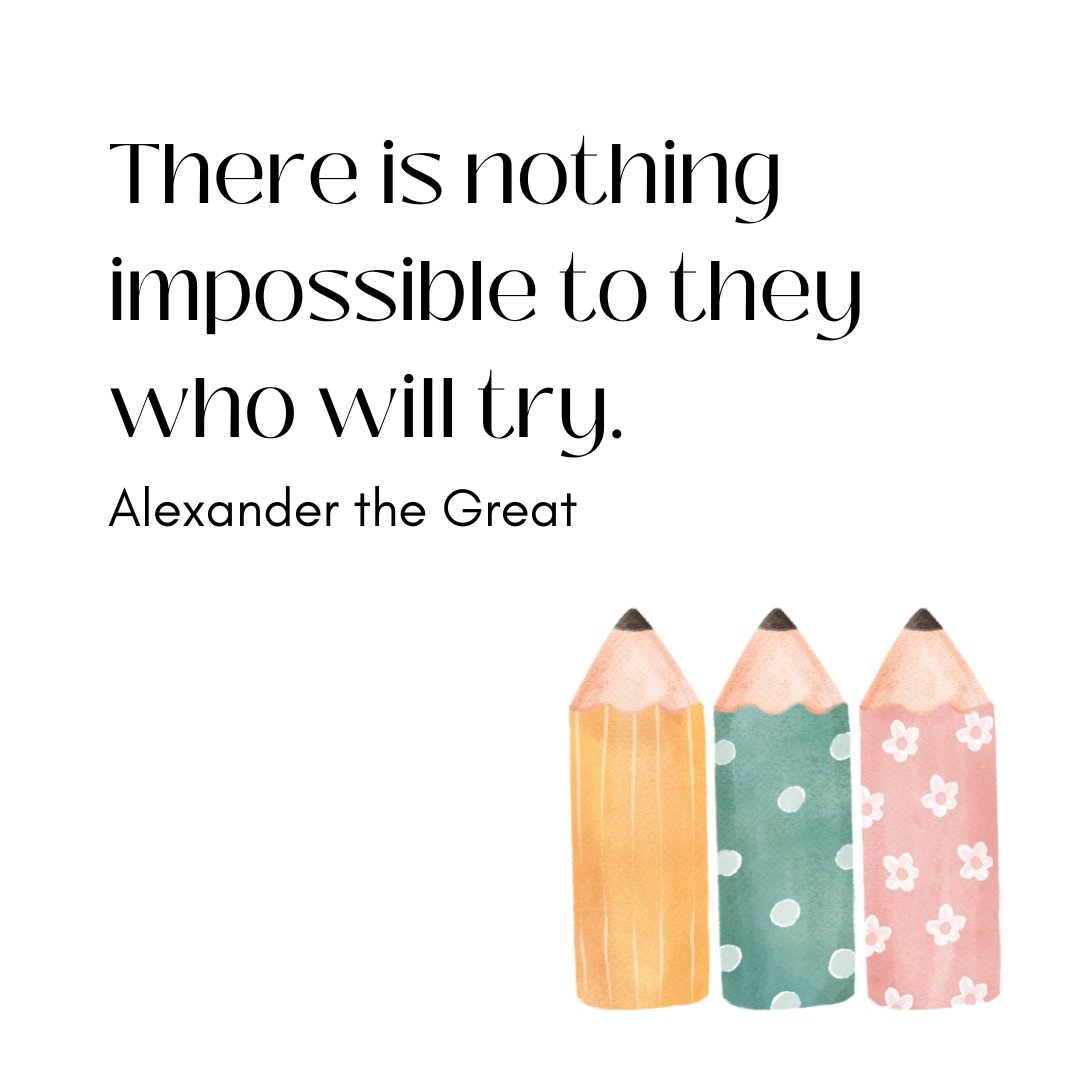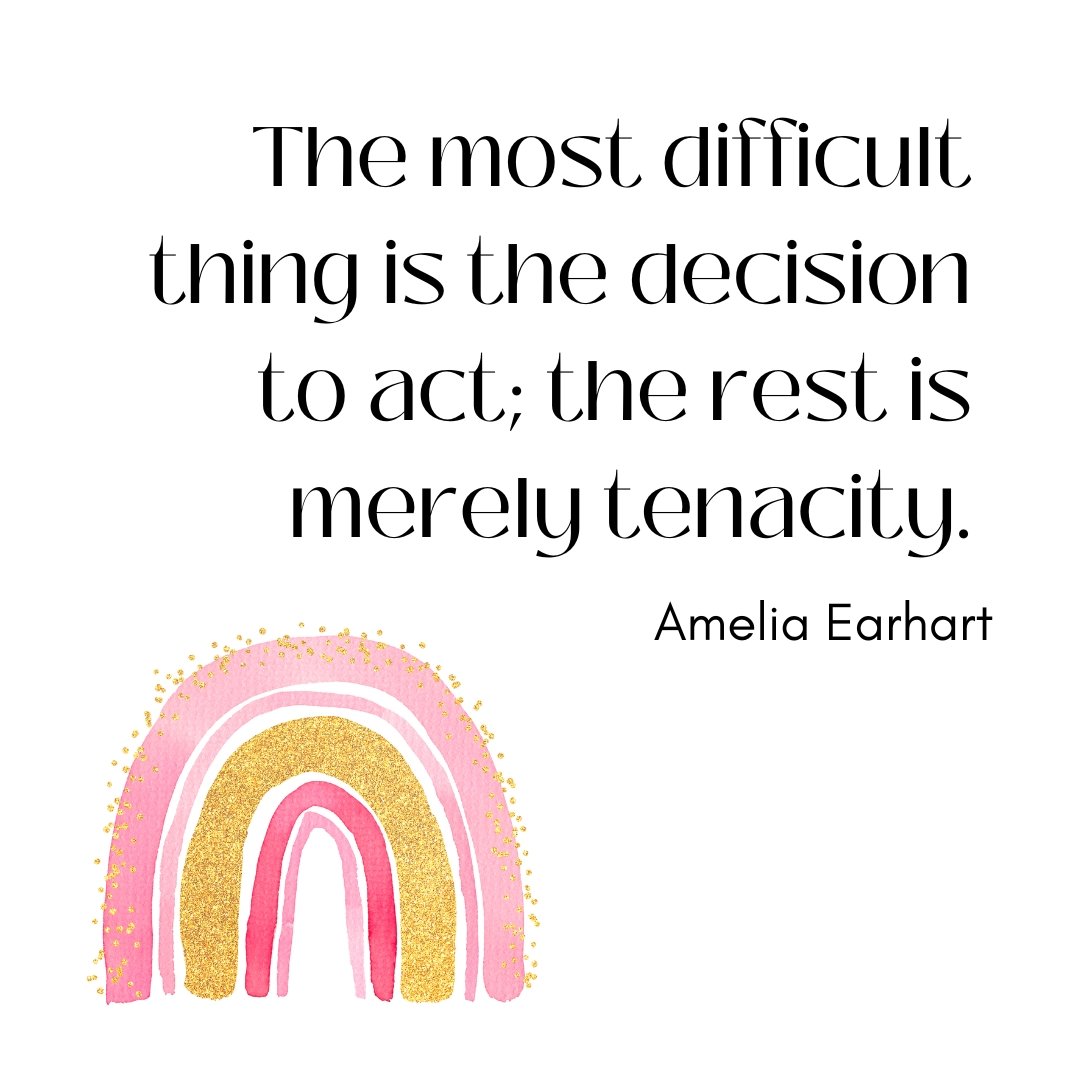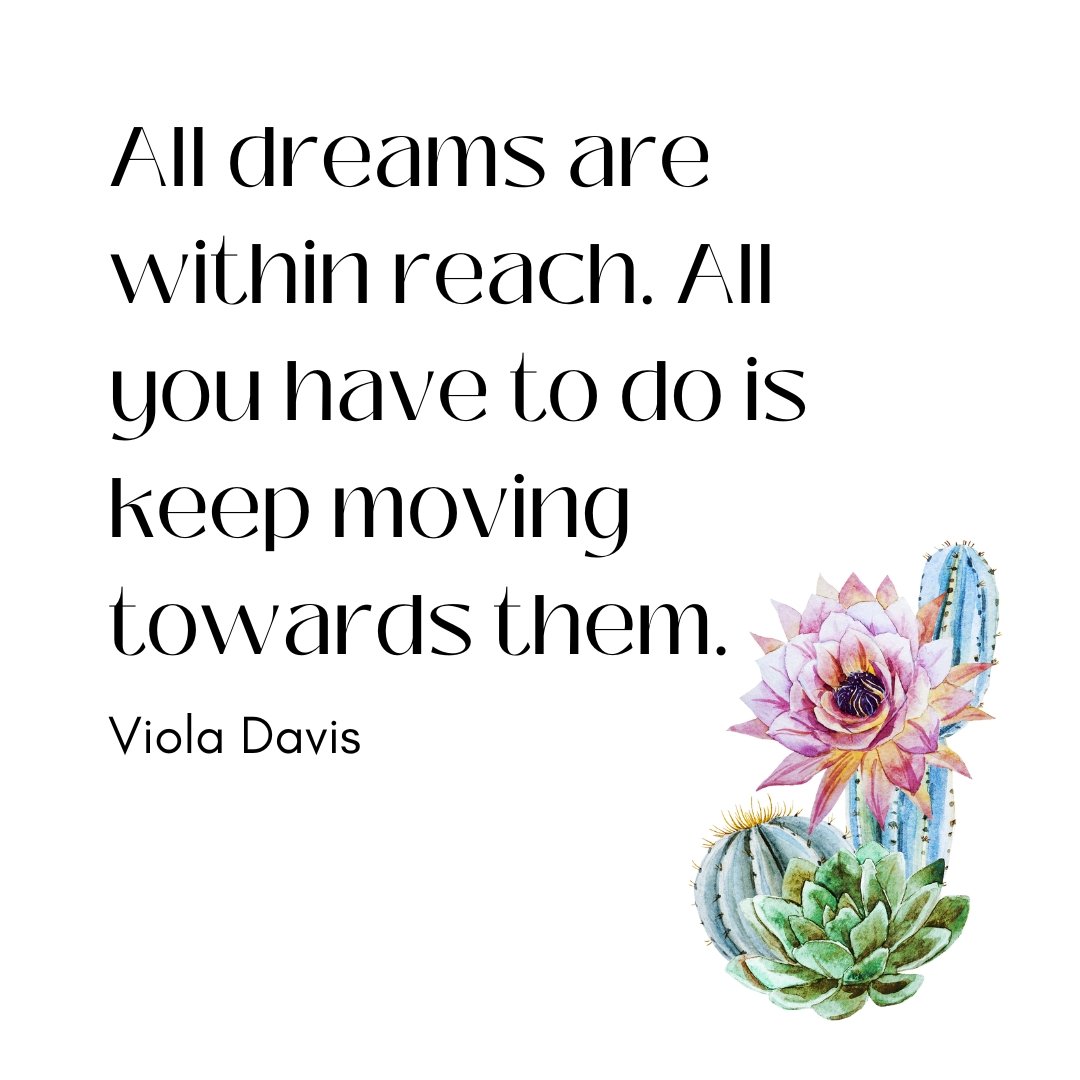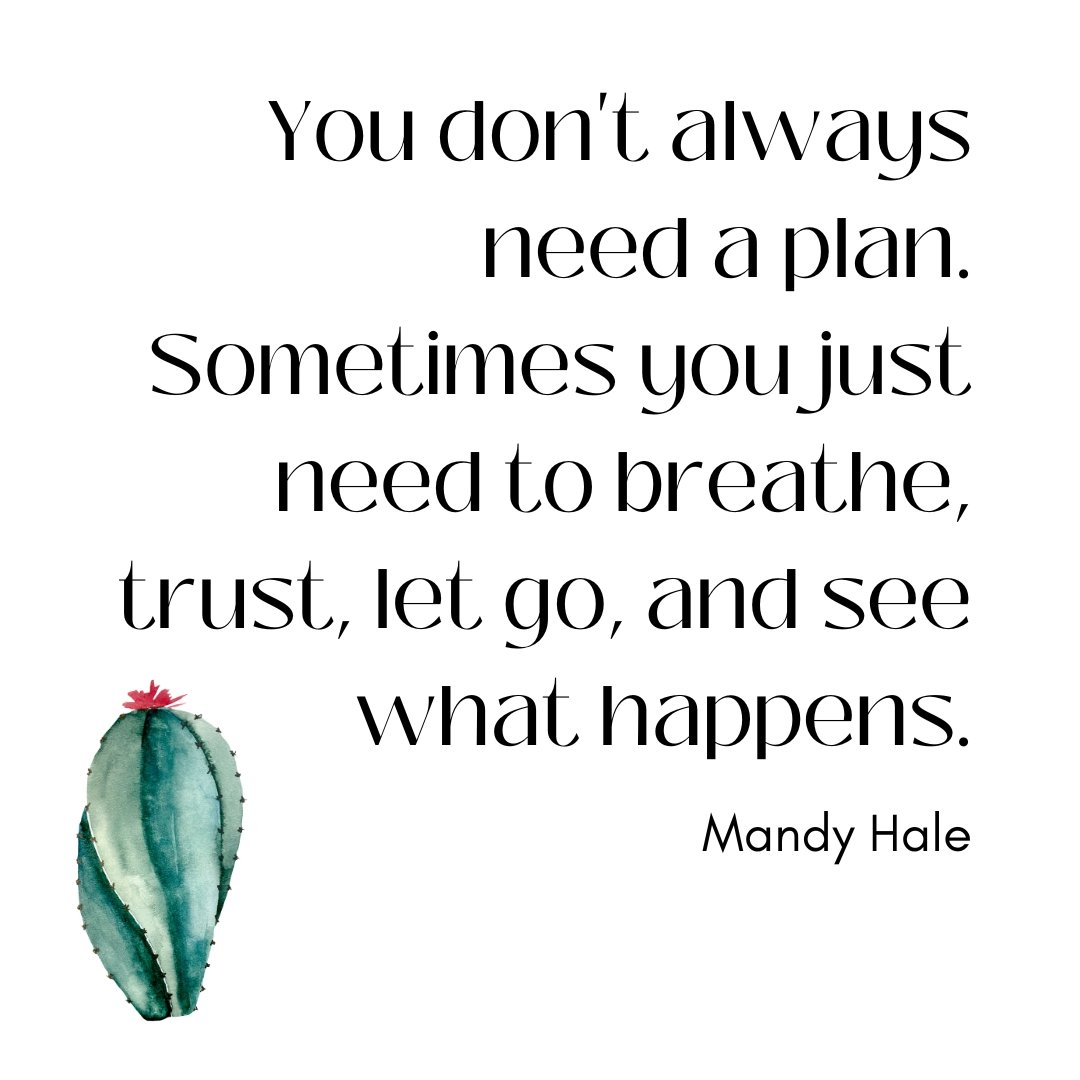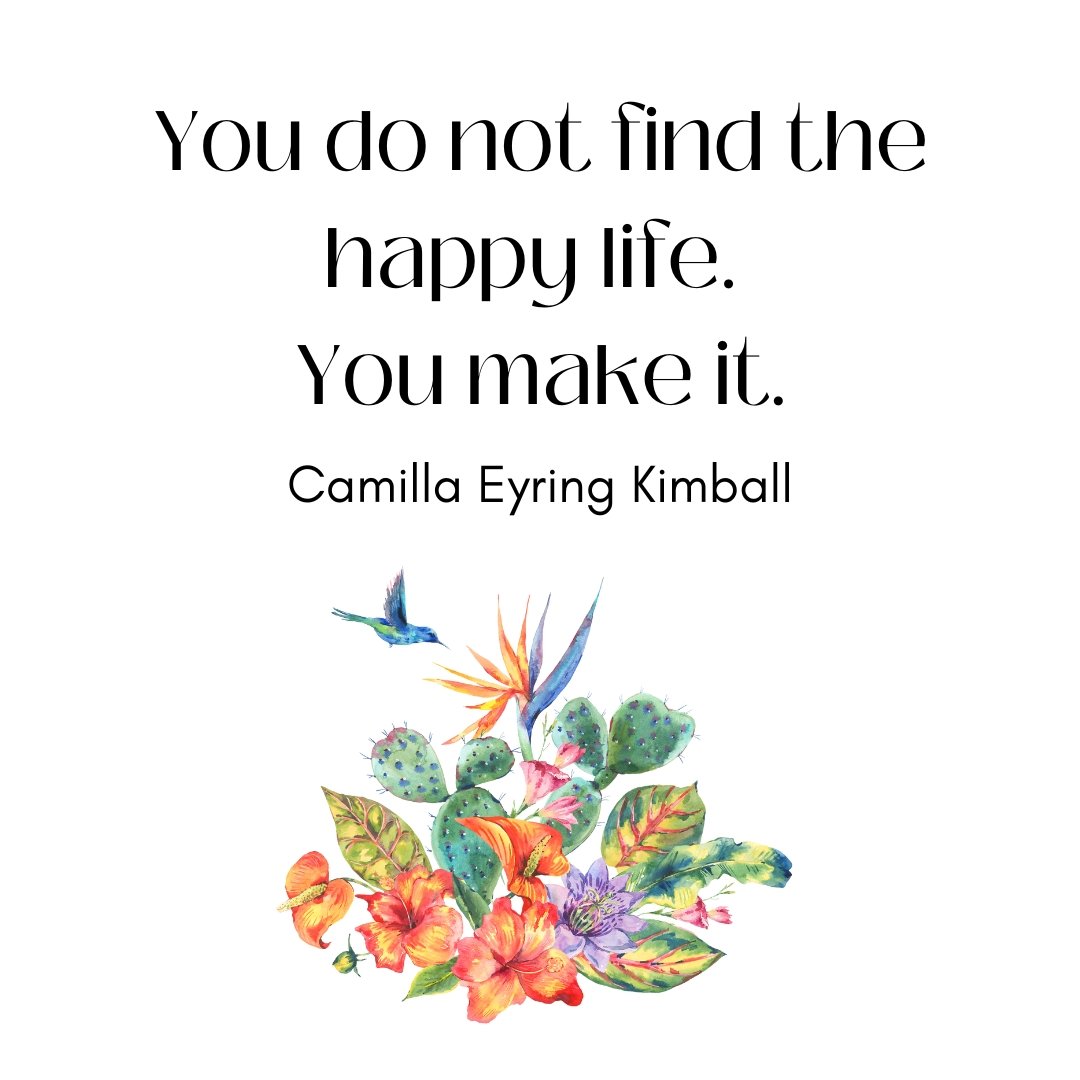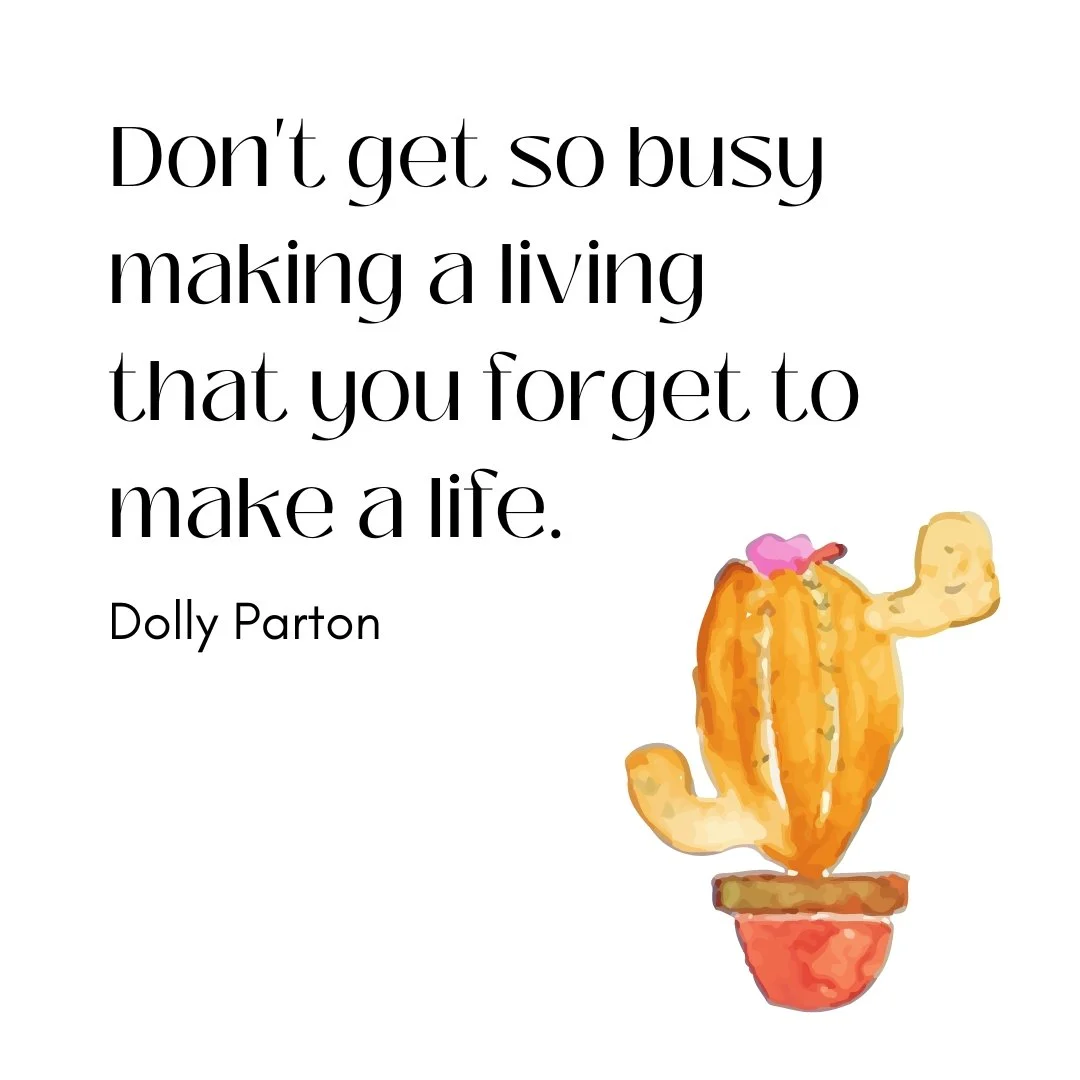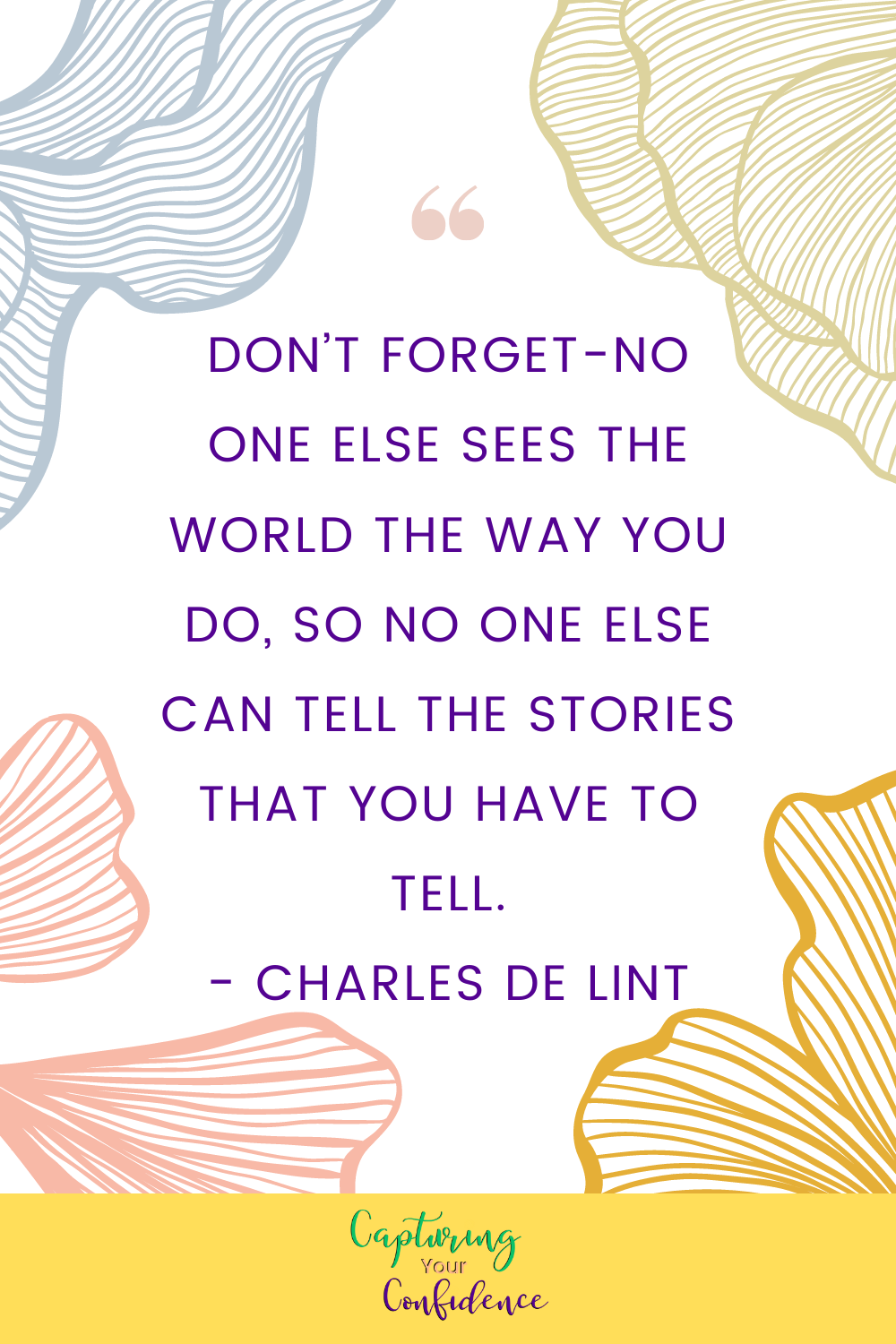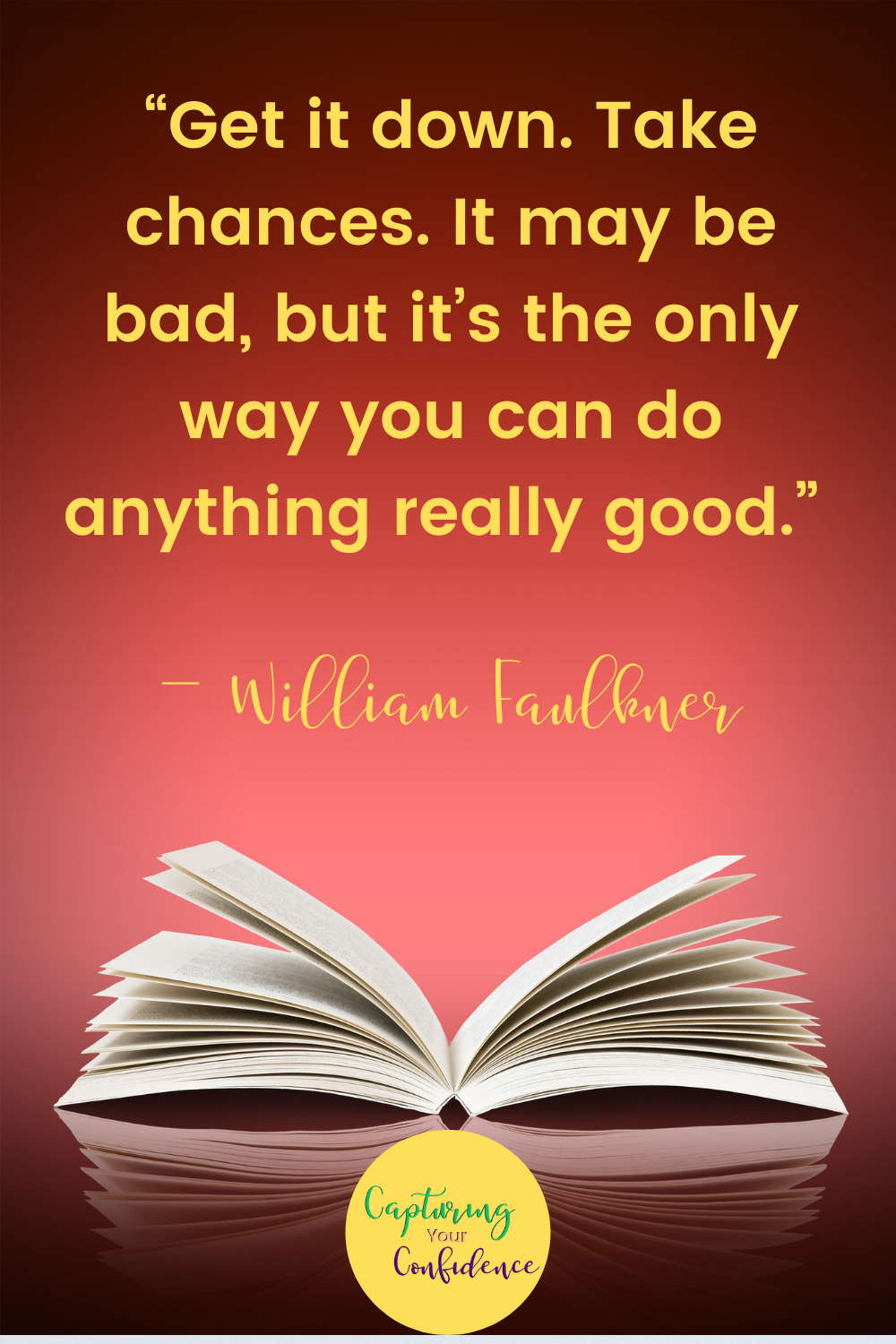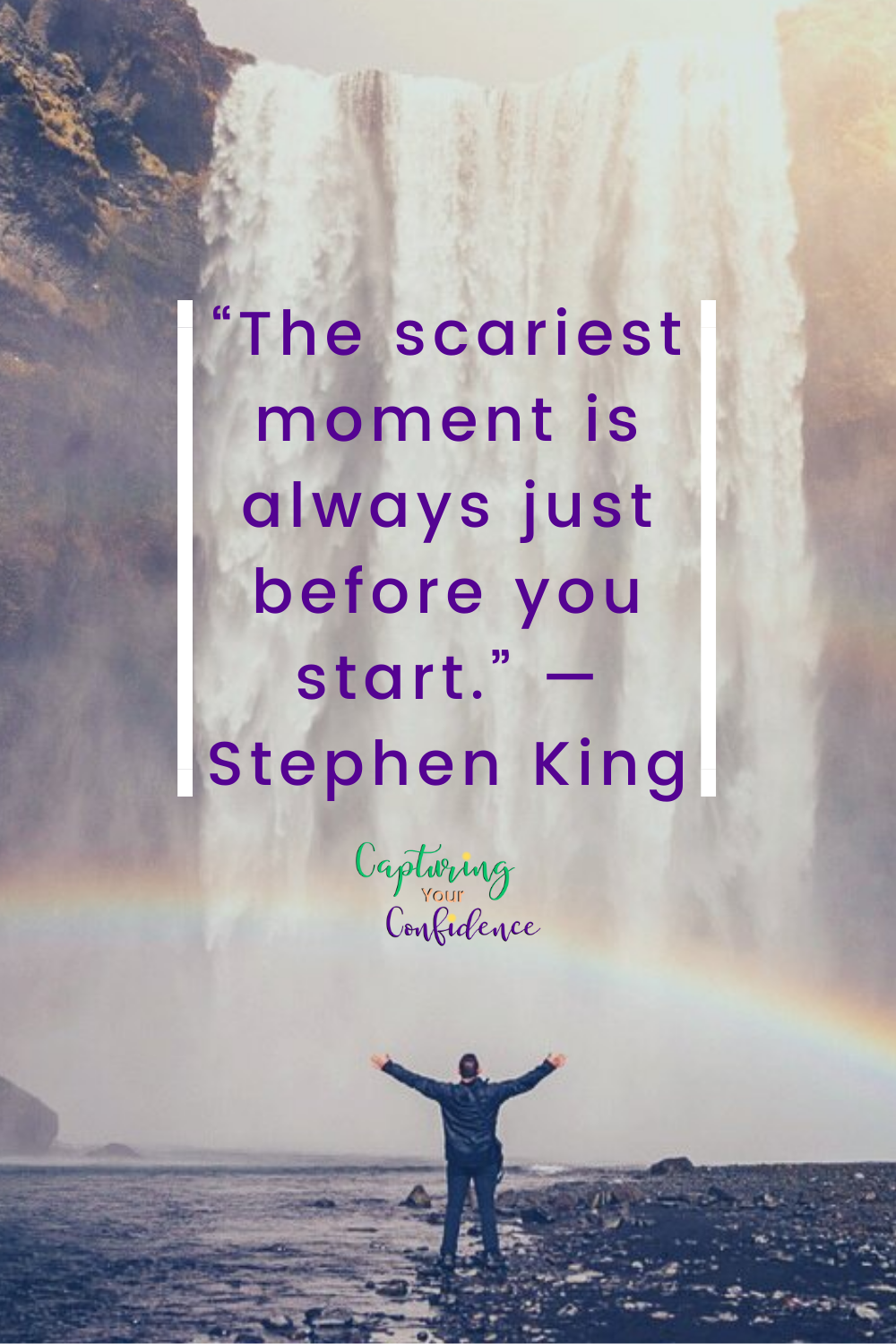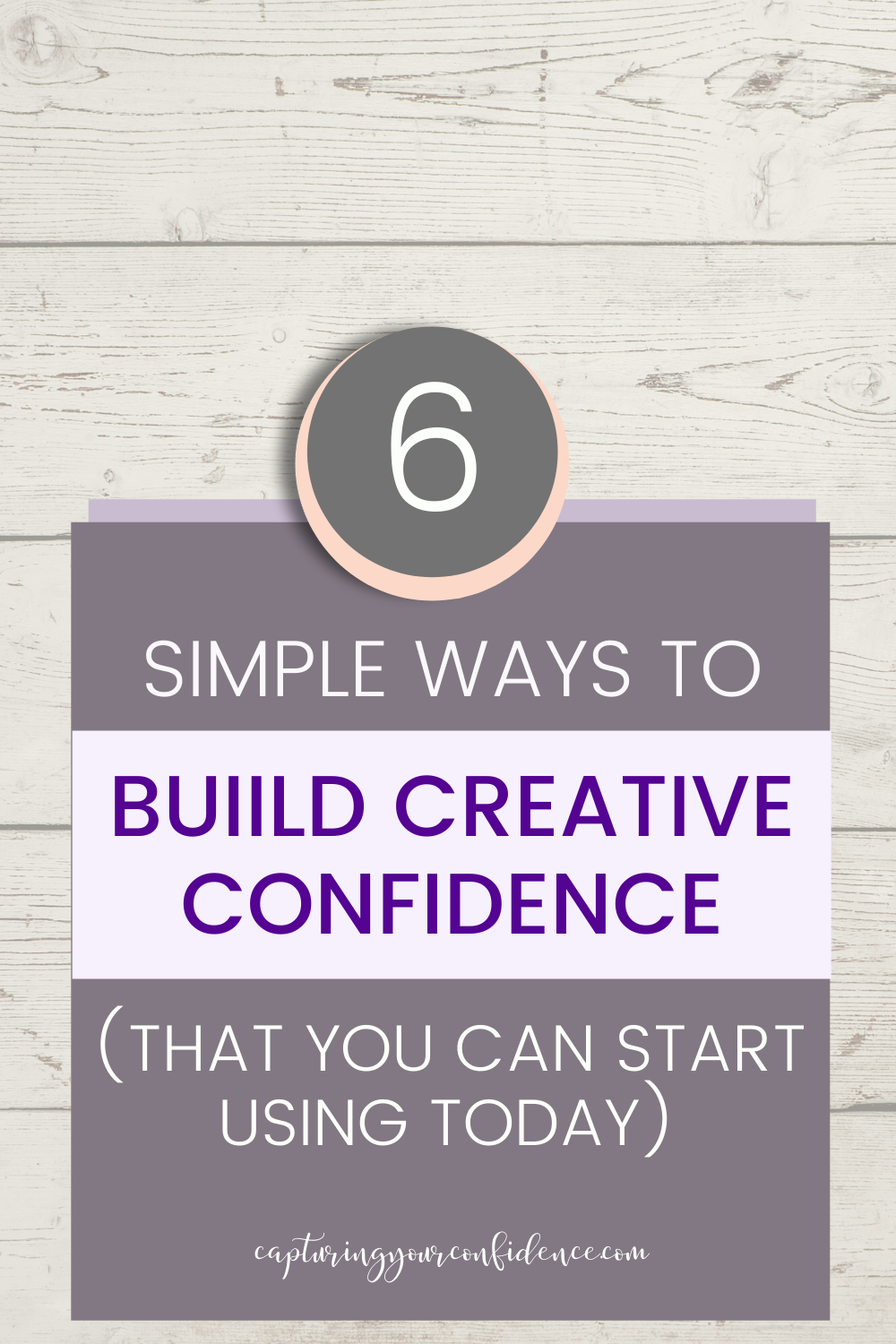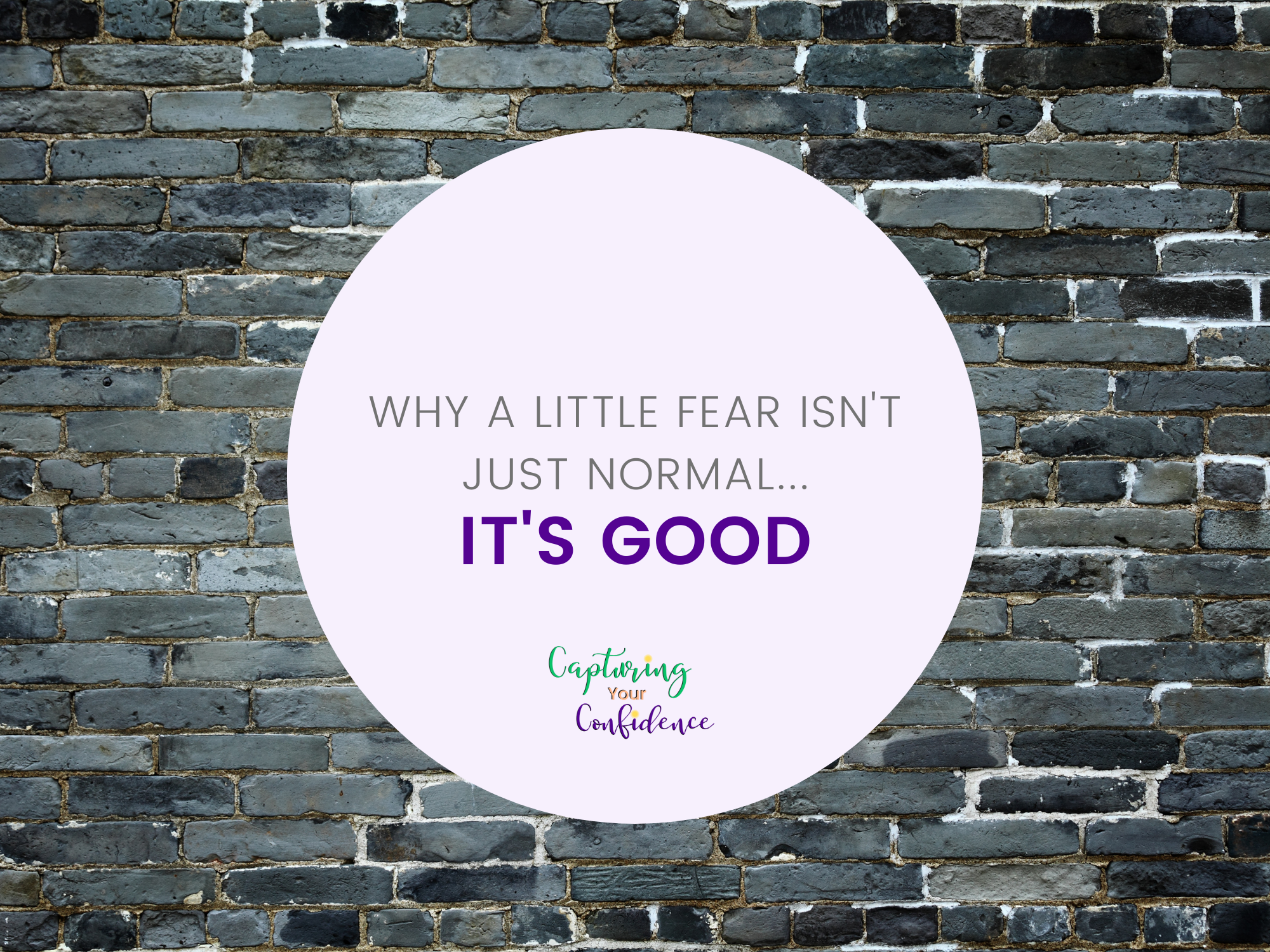
Blog
7 Inspiring Quotes for Busy Days
Some days we all just need a little pick me up. Here are some of my favorite quotes for when it’s that kind of day.
Some days we all just need a little pick me up - a reminder that even on our busiest days when life feels like it’s just too much, we’re still pretty awesome. It kind of comes with the whole human thing.
One thing I love to do is collect quotes. Maybe it’s the word person in me, but I would like to think that we can all get value out of hearing that other people have been where we are and have gotten out/up/figured something out.
So I wanted to share some of my favorite quotes when it’s that kind of day. It’s not always Monday, either! If you, like me, enjoy being surrounded by beautiful words, feel free to write them on a Post-It note for encouragement around your workspace.
No matter what today brings, or tomorrow, you’re worth taking a moment to breath. I see you, I feel you, you can get through this.
Even a little effort makes a difference! Your biggest dreams start with trying a little bit and taking small steps.
When you feel overwhelmed in the moment, take a deep breath in and slowly let it out. The only thing you have to do right now is decide what one small thing to do next. You can do this.
This busyness will not last forever. It will pass and you’ll get to where you want to be. Remind yourself that this discomfort is a temporary stepping stone.
Your dreams aren’t too big. Like Marie Forleo says, “Everything is figureoutable.” Keep taking small steps forward and remember what you’re working toward.
Sometimes you just need to take a leap of faith and let the universe show you what’s next. (Believe me when I say my anxiety brain HATES that this is true…but it is.)
Everyone has their own definition of what a happy life is. Whether your busyness is because of work or the season of life you’re in, you can choose to be happy with the small things each and every day. You are the one who makes that decision.
We need money to survive, but as cliché as it is, money isn’t everything. Beyond living comfortably, there are plenty of other things that make life beautiful when you create time to step away from the stress and busyness we all face from time to time (some of us more than others).
4 Creative & Productive Ways to Use Post It Notes
Do you use post it notes? In school we used them for ... As an adult, I’ve found many more uses that help ... There are many ways to help yourself be more productive. If you haven’t tried to use post its in these creative ways, you should.
Do you use post it notes? In school we used them for taking notes in lieu of highlighting in books, or as bookmarks. As an adult, I’ve found many more uses that help to keep me productive as a writer. Not only do they help me stay organized, but I use them to keep me on track and keep me motivated.
There are many ways to help yourself be more productive. If you haven’t tried to use post its in these creative ways, you should.
4 Creative Ways to Use Post-Its
As a writer, all the thoughts and ideas that swirl around in your mind can be overwhelming. Sometimes you need new techniques or tools to help you organize them and keep you moving forward towards your goals.
Here are four of the best ways I’ve found to use post its for my productivity.
Making Notes when You’re Reading
Whether you are reading fiction or nonfiction, taking notes as you read can help when you find something you want to take with you into your own writing. What better to make a quick note than a post it?
Anytime I come across a certain technique, trope, or tip I like in a book, I stick a post it on the page, noting what I want to remember. This allows me to move on without too much distraction. It’s also helpful when I’m working on my own writing and want to try out some of the same techniques. I can go back to my post it notes instead of wasting precious writing time skimming that part of the book.
There are so many ways you can use post its as you read. It might mean noting the way a certain author uses dialogue, or the way they describe a character. It can even be as simple as liking a word and not wanting to forget it. Writing is a process and you can use sticky notes to fit your style. Have fun with it!
You can color code, like using yellow for dialogue and orange for descriptions. Whatever helps you remember the best, try it out! No harm in testing new strategies, right?
Organize Writing Notebook
If you have a writing notebook, you can use post its to organize it. Writing notebooks are a great resource for anyone working on creative projects, especially long ones. Curious about what goes in one? Read this.
Post its can differentiate the sections of your writing notebook. If you already have tabs, you’re ahead of the game! Post its can still be useful to flag information you’ll reference a lot or that you know will be important later in the writing process.
Sticky notes can also keep your scenes in order. You can mark each section within your notebook with a different colored post it, or label them if you don’t like to use color coding.
Everyday Reminders & To Do Lists
Whether you’re a full time writer, or simply write for the love of it, most of us are busy. Planners are useful, but sometimes you may need a little extra reminder. When there’s something pressing that I have to get done in a day, I use post its to remind myself.
I’ll make a to-do list and stick it on my computer or put the most pressing task on my bedroom door so that when I inevitably exit, I’m reminded of that task. We can’t remember everything, and we don’t need to with helpful reminders like this around!
Motivation
Just as you can stick to-do lists around the house where you’ll be sure to see them, you can (and should!) stick motivational quotes or sayings around the house, too. Even if you aren’t someone who believes in manifestation or the power of positive thinking, having words you love around you will put you in a good mood.
For example, try writing “You can do this!” on a post-it. Stick it to your mirror and every time you look at yourself in the mirror, you’ll get a little happy reminder. Being your own cheerleader is a great way to keep yourself motivated. It’s nice to have others cheering us on too, but we spend the most time with ourselves. We need to be able to boost ourselves up when we need it.
When you’re feeling down, look at your quotes and let them remind you why you’re doing this. You are strong. You are brave. You can do this. Don’t let negative thoughts or imposter syndrome get the best of you. Use your post it notes as an easy way to surround yourself with positivity.
Keeping inspirational quotes handy can also help when you encounter writer's block. You never know when you’ll need a little extra spark of inspiration to get the writing juices flowing again. Have a few of your favorite inspirational quotes written on post it notes in your writing area and look at them whenever you get stuck.
Find your favorite post its, try out some new strategies, and see what works best for you. Incorporate that into your daily life! Sometimes we forget that there are ways to make our lives easier, and need a reminder that we don’t have to do this (or figure it all out) on our own. If there’s something else you use that helps you stay productive, let us know so we can share it with our writing community!
Hope for the New Year
It’s the last day of 2021, and I’m both shocked and thankful that it’s finally here. I wanted to share my hope with you today because I think it’s what we all need... The whole world has had a rough year, and we all could stand to use a little tiny slice of hope, and the warmth that brings to our heart.
Friends,
It’s the last day of 2021, and I’m both shocked and thankful that it’s finally here.
This year has been HARD. The kind of hard that feels impossible.
Usually this time of year I find myself reflecting on all the things from the year. Good things typically outweigh the challenges, and I almost always feel like there are some redeeming qualities that make the year a “good” one instead of the notorious so-called “bad” year.
This year, though, I don’t feel like rehashing the events of the year is a productive exercise. Sure, I will reflect. Sure, there have undoubtedly been amazing things that have happened! And I’m entirely grateful for them.
But for the first time, it doesn’t feel like a good year as a whole, and I’ve come to terms with that. As my good friend told me earlier this week, it’s best to ride with our emotions, whatever they may be, rather than fight against them. We can’t always control the things we’d like. Most times they’re things we shouldn’t be controlling anyway.
So as we finish this year, I wanted to share a message of hope.
I’m entirely joyful about the new year. I know there will be more challenges, because there always are. But after this year, I’m sure I can face anything that might dare to come my way. I hope that for you, too.
I wanted to share my hope with you today because I think it’s what we all need. The whole world has had a rough year, and we all could stand to use a little tiny slice of hope, and the warmth that brings to our heart.
So here it is:
I hope you have amazing things to look forward to next year, even if this year has felt like a big dumpster fire (same).
I hope you’ll continue working to be who you want to be, and not who anyone else wants - because you deserve to.
I hope you have a dream as big as the stars and that even when you’re afraid of how big it is (as all huge dreams tend to be), you’ll keep stepping forward one step at a time. One day at a time.
I hope that no matter how you’re feeling today, or have felt this month, or the rest of this year, that you’ll wake up tomorrow and see it as a chance to start fresh.
Cheers to a new year, a new us, and new beginnings.
May we be open, willing, and ready to accept new challenges and be brave enough to face each new day no matter what it holds.
We’ve got this, together.
25 Inspirational Quotes for Writing
Finding the motivation to write can be difficult some days. You probably don’t want to force yourself to write, but if you need to get some writing done, an extra push can help get you going. Sometimes all we need is a little inspiration before we dive into writing. Here are 25 inspirational quotes to spark your inspiration!
Finding the motivation to write can be difficult some days. You probably don’t want to force yourself to write, but if you need to get some writing done, an extra push can help get you going. Sometimes all we need is a little inspiration before we dive into writing.
Here are 25 inspirational quotes to spark your inspiration!
“If there’s a book that you want to read, but it hasn’t been written yet, then you must write it.”
“Read a thousand books, and your words will flow like a river.”
“You fail only if you stop writing.”
“If the book is true, it will find an audience that is meant to read it.”
“Don’t forget-no one else sees the world the way you do, so no one else can tell the stories that you have to tell.”
“If I waited for perfection… I would never write a word.”
“The Six Golden Rules of Writing: Read, read, read, and write, write, write.”
“Writing—the art of communicating thoughts to the mind, through the eye—is the great invention of the world.”
“You can always edit a bad page. You can’t edit a blank page.”
“There is no greater agony than bearing an untold story inside you.”
“A professional writer is an amateur who didn’t quit.”
“This is how you do it: you sit down at the keyboard and you put one word after another until it’s done. It’s that easy, and that hard.”
“Start writing, no matter what. The water does not flow until the faucet is turned on.”
“Write while the heat is in you. The writer who postpones the recording of his thoughts uses an iron which has cooled to burn a hole with.”
“Get it down. Take chances. It may be bad, but it’s the only way you can do anything really good.”
“To gain your own voice, you have to forget about having it heard.”
“Do not hoard what seems good for a later place in the book, or for another book; give it, give it all, give it now.”
“It is perfectly okay to write garbage—as long as you edit brilliantly.”
“When you have a dream, you’ve got to grab it and never let go.”
“No matter what people tell you, words and ideas can change the world.”
“You are never too old to set another goal or to dream a new dream.”
“First, you write for yourself... always, to make sense of experience and the world around you. It’s one of the ways I stay sane. Our stories, our books, our films are how we cope with the random trauma-inducing chaos of life as it plays.”
“The scariest moment is always just before you start.”
“I believe there is power in words, power in asserting our existence, our experience, our lives, through words.”
“People are going to judge you all the time no matter what you do. . . Don’t worry about other people. Worry about you.”
There are so many great quotes that can help inspire you to write. Hopefully some of these will spark your creativity and get the words flowing.
Do you already have a favorite quote that inspires you to write?
Let us know in the comments!
How to Show Gratitude in Business
Showing gratitude can help your business grow. Establishing a culture of gratitude is an easy way to set yourself up for success. It’s one of the easiest things to do but somehow always gets forgotten. This blog explains a few easy ways to show gratitude for those you work with.
It’s the time of year to reflect on what we’re grateful for. Although we often focus on gratitude for the holidays, we should practice gratitude more than once a year because it will help our businesses grow.
Yes, showing gratitude can help your business grow.
It’s one of the easiest things to do but somehow always gets forgotten. People start to feel resentful, unvalued, disrespected, and unappreciated, which leads to an unhappy workplace with high turnover - unappreciated customers who don’t return to purchase from your business.
Establishing a culture of gratitude is an easy way to set yourself up for success.
Why Gratitude is Important for Business
Are you more likely to do business with someone who takes your money and runs, or someone who shows genuine appreciation for your business? I’m guessing the latter (let’s face it, we all want to be appreciated). Showing appreciation for “your people” greatly improves the amount of business you receive and builds your loyal customer base. People will keep coming back to you when they feel truly appreciated and valued.
On the other hand, employees and employers need to feel appreciated, too. An excerpt from Intelligent Change reveals something interesting about U.S. workplaces:
“Recent research conducted by the John Templeton Foundation revealed that for Americans, the workplace is the least likely place to express gratitude. Although as many as 93% of the respondents agreed that a grateful boss is more likely to succeed, and almost all of them agreed that a simple ‘thank you’ at work made them feel valued and respected, only 10% were actually prone to express gratefulness. The majority, or 60% of the respondents, have never expressed gratitude at work, or have only done so once a year!”
That’s pretty sad! How does showing gratitude once a year foster a positive work environment? It doesn’t. Employees and bosses need positive affirmation, encouragement, and to feel respected and appreciated to be their best selves in the workplace. It will make work more enjoyable for everyone, which is important since we spend so much of our one life doing it.
How to Adopt an Attitude of Gratitude
It takes a conscious effort to choose an attitude of gratitude. It’s not something that happens overnight, and even for those who practice gratitude regularly, it can be harder on difficult days. Adopting a gratitude mindset and intentionally practicing gratitude every day will get you there, though. And it’s definitely worth it.
Mindset
I like this definition of a gratitude mindset from Lucemi Consulting:
“When you have a gratitude mindset, you focus on the limitless opportunities available in business and life because you already appreciate what you have. When you are grateful, you choose to focus on the positive things rather than the negative things.”
Mindset is key when adopting an attitude of gratitude. You can see opportunity everywhere, but you’re aware of and thankful for where you are and what you have today. No one can take away your choice to be grateful for the life you have or the opportunities you’ve been given.
Attract What You Put Out in the World
You attract what you put out in the world. (Yes, it’s the law of attraction - you knew it was coming.) If you’re constantly throwing negativity into the world, you’re going to get negativity back. If you switch that mindset and start putting positivity into the world, you will attract it back to you. If you constantly show gratitude to people, they will return the favor.
Another aspect of this is that whatever you’re putting out in the world, you notice more in your own life. In the case of gratitude, when you constantly praise people for the work they’ve done, you notice when people do the same in return. Sometimes small notes of praise can go unnoticed, but when you make that a core value of your business, you notice when people are expressing gratitude towards yourself and others.
4 Ideas for Showing Gratitude in Your Business
Obviously showing gratitude is important to growing your business, but how do you go about actually doing that? Here are a few ideas of how to start.
Keep a Gratitude Journal
I like to practice gratitude journaling in the morning. It sets me on the right foot for the day. I make a list of 10-15 things that I’m grateful for. I try to be really specific, too. Not just “food” (which, of course, I am grateful for). Instead, I would write something like, “I am grateful that I have the means to purchase food I want.” Be specific when you fill out a gratitude journal. It will be fun to look back after a few months or even years to see how much you’ve grown and developed as a human.
Be Grateful for Small Things that Happen Every Day
Do you know how many small things happening every day that you can be grateful for? Probably hundreds. During your gratitude journaling, identify small things that have happened to you in the last day or two that you can be grateful for. In addition (or alternatively), you can log your gratitude each night in a journal or app like Pixels.
Send Gifts to Clients or Customers
Client gifts aren’t just for the holidays. You can send thank you letters when they sign with you, a quick birthday message, or a small gift of congratulations when they hit a milestone in their business. It’s always nice to receive “fun mail,” as I like to call it. It makes clients feel special and appreciated.
Show appreciation to employees
We’ve all been part of the corporate world and felt unappreciated. If you haven’t, you’re one of the lucky few. It makes you dread work every day, resentful toward the company, and often straight-up miserable. Create a culture of gratitude and appreciation among employees. Give them positive affirmations, small gifts or thank you cards, and encourage employees to show gratitude among themselves, too. An appreciated employee is happier and has a higher job performance. Who doesn’t want that for the people who work with them?
P.S. Freelancers and contractors who do work for you count, too!
I encourage you to practice showing gratitude daily. Start a daily gratitude journal, send gifts to clients or customers, and create a culture of gratitude by regularly showing employee appreciation. Not only will your business flourish, but you and everyone around you will be happier and more grateful people. We need more of those people in the world, don’t you agree?
6 Simple Ways to Build Creative Confidence
Doing creative work requires some semblance of confidence, whether to help get you started, or to keep you going. Without confidence, you can run into problems like writer's block, imposter syndrome, and overall fear and anxiety about your work... When you feel confident in your own work, other people will feel more confident about it, too.
Doing creative work requires some semblance of confidence, whether to help get you started, or to keep you going. Without confidence, you can run into problems like writer's block, imposter syndrome, and overall fear and anxiety about your work.
Having confidence in your own writing takes it to a whole new level. When you feel confident in your own work, other people will feel more confident about it, too.
What is Confidence?
In the most basic sense, confidence is the “quality of being certain of your abilities or of having trust in people, plans, or the future.”
Confidence has everything to do with how we feel about the actions we take (or could take) to be successful. When we’re confident, we feel sure we can accomplish what we need to serve others and ourselves, as well as succeed in the future.
In other words, confidence helps you on your road to success. (If you want to read more about confidence, we did a mini-series about it.)
Why Do Some Writers Lack Confidence?
It feels like it should be easy to stay confident in yourself, but it’s often hard to do. You’ve probably wondered whether your writing is “good enough” - and so it is with many writers. We’ve all been there. It’s a human thing to question yourself - and completely normal.
When you tell other people you're a writer, they ask questions, too. Some questions seem harmless, like “What do you write?” Other questions, such as “When are you going to get published?” can create a sneaking doubt in your mind and make you wonder if you’re good enough to get published. And if so, what will people think? Will people want to read it? And what if they do and they don’t like it?
Then there’s the ever-famous bad experience that seems to happen to all writers at one point or another. For those of us who love writing and have been doing it since we were young, we often started out full of confidence - of course our ideas were good! Then, we have a moment or an encounter where someone gives us negative criticism we don’t know what to do with that alters the course of our writing lives. It sometimes takes years for confidence to grow (and for some it never quite comes back in the same gleeful way).
So what do you do about these doubts? And how the heck do you gain confidence in yourself and your writing when it feels impossible?
6 Ways to Build Creative Confidence
These are some of the ways we (and our clients!), here at Capturing Your Confidence that work - writer to writer.
Journaling
Journaling is great because you never have to show it to anyone, so you never have to worry about whether people will enjoy it. Journaling is all for you. It’s a safe space where you can write about anything you want.
It can be a daily routine (like Rachel’s morning pages practice); a place to write out all your story ideas; a place to vent all your fears, successes, or memories you want to remember; or, you can use it for all of the above.
If you need multiple journals, that’s okay! Journaling is meant to help you, whatever that might look like.
Start Small
If you want to write, but it seems too daunting, start small. You can always work your way up to your longer term goal. For instance, say you want to write a book, but you’re not sure if you can (because it is a lot), you can start with a short story or essay.
It doesn’t have to have anything to do with what you want to write your book about. The process of writing that shorter piece will help you figure out things like how quickly or slowly you write, what style and genres you prefer, and whether or not you actually want to write something longer.
If you’re thinking about writing professionally for readers online, you can start small by writing guest posts on someone else’s blog. Doing this helps you test the waters before you make the commitment to building your own blog. You can also publish on sites like Medium, where you don’t have to pay to post, but you can see if what you’re writing about is something people are looking for.
No matter what you want to write, there are ways to work your way up to that end goal.
Read Your Writing & Find Things You Like (On Purpose)
One of the best things you can do for your writing confidence is to read your writing. Be intentional about it - find your favorite parts and best lines. Ignore the pieces that you feel aren’t up to par (let’s be honest, it can’t all be gold), and really feel the pieces you’re proud of.
Whenever you’re feeling self-doubt or just need some inspiration to keep writing, go back and read those pieces you picked out. Remind yourself that you are good enough, no matter what anyone else says. It’s easy to forget your own capabilities when you aren’t looking back at your work.
Writing is a constant growth & learning process and it’s important to look back to see how far you’ve come.
Share Your Writing with One Person
When you’re ready to share your writing with someone, choose one person you trust to start with. Tell them exactly what you want from them, whether it’s honesty, or simply to hype you up. It’s okay to want someone who will point out the good pieces of your writing for your first outside perspective.
Eventually you’ll need them to tell you what needs work, but if you’re not ready for that, don’t feel pressure to ask for that on your first share. The worst feeling is giving someone your work and having them tear it apart when it wasn’t ready for that type of criticism yet. Don’t ask for the brutal honesty until you you’ve edited and worked to make your draft as strong as it can be without an outside eye.
DO NOT CHOOSE SOCIAL MEDIA AS YOUR ONE PERSON.
Let me repeat that: when you select the first person to read your work, DO NOT share it publicly on any type of social media platform. This is a recipe for a shitstorm of criticism, which is not what this first person share is about.
Take a Break from Social Media
First, a note: we’re not anti-social media here. You can make connections with fellow writers, and run effective marketing for your book on social media. It’s a great opportunity to meet people you probably wouldn’t in real life!
But it’s a double-edged sword. If you’re scrolling through Insta or TikTok for hours on end, you have less time for your own creative work. It’s easy to fall into the trap of comparing yourself to others, which saps creativity, sometimes without you even knowing it’s happening. Imposter syndrome anyone?
Much of what you see on social media isn’t real anyway.
Someone may say they write for five hours everyday, or read twenty books every month, but you don’t know that’s actually the case. Even if it is, they’re not you. Everyone is different. Everyone writes and reads at a different pace, and everyone experiences self-doubt sometimes (even the loudest people).
So, make sure to take a break from social media every once in a while. Even if it’s only for a day, take a step back and remind yourself of who you are and why you’re writing. Take a day to explore and inspire yourself, or to rest and relax. Whatever you need to do, allow yourself those moments to rejuvenate yourself.
Keep Practicing, Even When You’re Not Feeling Confident
Even when you’re not feeling confident, write anyway. It doesn’t have to be your best work. In fact, if it’s something that feels like garbage, that’s okay, too. We all do it, words don’t come out perfect, even for the best of us. That’s what editing is for.
You don’t even have to do anything with it. All the time you spend writing is making you a better writer. Practicing even when you’re not confident can sometimes (inadvertently) lead to some of the best work, which is sure to restore at least a little confidence. Remember - all you have to do is write. Everything else is peripheral.
My challenge to you is to try these tips when you need a confidence boost and let us know what works best for you!
Why We’re All a Little Scared of Success (But Need to Act Anyway)
We here at Capturing Your confidence have been afraid, especially in our writing lives. We’ve been the ones who were afraid people wouldn’t like our writing...The only difference between us and anyone else is that we didn’t let those fears hold us back. And you don’t have to either! We’re not promising that fear will go away... But you can move forward anyway. Here's how.
We’ve all felt the fear of failure at some point. It can hang over any task no matter how small or seemingly mundane.
But, have you ever been afraid of what might happen if you succeed? It raises bigger questions like: What would I do if I got the promotion? What would I do if I wasn’t drowning in debt? How would I feel if my book did get published?
If you’ve thought about these things (or something like them), you’re not alone. It’s okay to worry about what might come with success, or the burdens that would bring. It’s okay to want to be successful, but also be scared of success. That doesn’t mean you can’t or won’t still succeed.
Why Success is Scary as Hell
No matter what you’re doing, new things can be scary. No matter how many times you’ve succeeded in other areas of your life, each success brings about tasks and feelings you’ve never encountered before. Let’s be honest, newness and change aren’t always exciting, even when we desperately want them to be.
And even when changes bring great new things into your life, there’s still the fear of the unknown. You don't necessarily know how success will look until you get there. It could look like opportunities beyond your wildest dreams. But it could also look like hardships and stress you don’t yet know how to handle. Sometimes it’s the not knowing that’s the scary part.
Success also creates a new normal. You’ll probably see and feel a lot of changes as you grow (we sometimes lovingly call these growing pains). The reality is that your life will be different. That’s the goal, though, right? Leaving our current routine and comfort zone so we can get to somewhere better. Not that saying it out loud makes it less terrifying, but it’s real.
Scary, But Important
Success brings a lot of amazing opportunities into our lives. As you work toward your goals, you gain knowledge of what leads to success and how to do it again. More specifically, you learn about yourself and what you can do. As you make leaps and bounds past your goals, you learn what works and what doesn’t, what keeps you motivated, and what brings you to a screeching halt.
With the inevitable trial and error it takes to succeed, you’re also gaining experience. Experience helps you to feel more confident in yourself and your skills, and showcase that to others. When you’re trying to find a job or, as a writer, find someone to support your writing, people want to know about your “experience.” We’ve all had that interview question that went something like this: Tell me about yourself and what experience you would bring to the role. With each new goal you reach and success you achieve, you’re building this much sought after experience.
Experience and knowledge are great, but what’s most important isa actually growth and personal development. Every time you learn something new, develop a new skill, fine tune an old skill, make an error, correct yourself, or reach a goal, you grow as a person. You’re becoming a better version of yourself, which, really, is the ultimate success.
Do the Thing that Scares You, Even When You’re Terrified (You Won’t Regret It)
If you stay in your comfort zone forever, you won’t succeed. At least not as much as you dream of because you don’t grow without fear. And if you’re not growing at least a little, you’re probably not succeeding in the way you want.
When you can take even tiny steps outside of your comfort zone, you get experience. For writers, this might look like finding a trusted friend to read a little of your writing even though the thought makes the hair on the back of your neck stand up like you’re in a scary movie. It might not seem like a big deal, and once you send the writing, it might even seem like a small step. But every step forward is progress, no matter how small. It’s one step closer toward your goals, and success.
If you don’t take these steps, you’ll never know how far you could've gone. Would you rather spend your one and only life stuck in your comfort zone wondering what could have been? Or take small steps that scare the living bejeezus out of you and actually find out? Give yourself the chance to find out how you can become a published author or the CEO of your dream business, or whatever dream you’ve been holding onto.
4 Ways to Conquer Your Fear
We here at Capturing Your confidence (all of us) have been afraid, especially in our writing lives. We’ve been the ones who had to close our eyes before pressing send on an email with our beloved book attached on its way to get feedback. We’ve been the ones who were afraid people wouldn’t like our writing, so we kept our most exciting projects to ourselves. We’ve even been the ones who’ve contemplated throwing drafts away or redoing them because we felt like they just weren’t good enough.
The only difference between us and anyone else (because ultimately we’re all humans) is that we didn’t let those fears hold us back. And you don’t have to either! We’re not promising that fear will go away - it won’t. But, we are promising that you can handle it. You can move forward anyway, and that’s what it’s all about.
Write down your worries & fears.
Writing down what’s weighing you down is a great start to understanding how to overcome your fears. Writing them down is helpful to pinpointing what’s causing the fears, why they’re happening, and how to deal with it. Sometimes they’re irrational, or sometimes they’re extremely real. Either way, you have to have a space to think about it in order to work through them.
Talk to someone.
Getting your fears out in the open and out of your own head helps as well. Sometimes we just need a listening ear and we can solve our problems mid-talk. Sometimes we need an objective outside opinion to remind us that we’re not crazy for being scared of these big goals and dreams. Often, the act of talking to someone we trust is soothing, and even if you don’t “solve” the fear, you can figure out ways to better manage it.
Focus on your goals.
Let your motivation drive you, not your fear. Remind yourself regularly why you want this and focus on the goal. This alone can sometimes be enough to get through momentary fears that feel paralyzing. This is probably the most difficult, and most effective way to get through your fears.
This is HARD. It’s not something you’ll want to jump out of bed and do (at least not right away - it’ll get easier as you practice). But it’s okay. It’s okay to ask for help, and it’s okay if you can only take the tiniest steps in the world. These tiny steps are still progress, and you can do this.
Break down your goals.
Make your big goals and dreams more manageable. It’s hard as heck to publish a book or start a business! But you know what those things start with? Small steps like deciding on a main theme or idea. Deciding what you like and feel passionate about, and then putting your ass in the seat and writing it down. 100 words is more than none - it doesn’t even have to be a good 100 words.
A list of people doing what you dream of doing is one step closer to being your own boss because you can start learning what’s possible. Breaking down your goals makes them less daunting and wears down your fear of the unknown and newness. Anyone who’s worn patent leather shoes knows: those damn things are painful (but pretty) when you start, but they become more comfortable as you break them in! You can do the same with your fears and successes.
Remind yourself of your goals & start taking control of your fears.
If you need help, reach out. We’re here to help.
Have you ever been afraid of success? What fear is holding you back right now? What’s one way you overcome your fear of the unknown? We’d love to hear about your experiences! Find me on social media, drop a comment below.
Let’s chat because you, my friend, are on your way to great writing.
How I Deal with Imposter Syndrome
As a writer, something I have to contend with on more occasions than I care to admit, is imposter syndrome. This is something that affects most (if not all) writers at some point. It’s hard enough to be a writer without having to battle with your own inner self-doubt and worry. So, today I’m sharing how I deal with imposter syndrome.
By Holly Huntress, Living Through Writing
As a writer, something I have to contend with on more occasions than I care to admit, is imposter syndrome. This is something that affects most (if not all) writers at some point. It’s hard enough to be a writer without having to battle with your own inner self-doubt and worry. So, today I’m sharing how I deal with imposter syndrome.
What is Imposter Syndrome?
Imposter syndrome is the feeling you don’t belong. That you aren’t good enough. When it comes to writing, it makes you feel like you aren’t really a writer. When you experience imposter syndrome, it makes you doubt yourself and your abilities - you feel as if you’re an imposter. Imposter syndrome can happen in any field, not just writing. It can put a damper on your spirits and hinder your writing. So, what do you do when it takes over?
How I Deal with Imposter Syndrome
More often than not, I find myself being sucked into a spiral of self-deprecating thoughts regarding my writing. I’m not as good as… I could never write that well… I’ll never be considered a real author… The list goes on.
A lot of the time my imposter syndrome stems from making comparisons between my writing and a book I’m reading. Never compare your unfinished/unpolished writing to that of a published novel/work. The book you’re reading has been through multiple rounds of professional edits and beta reads. Your writing is still in its early stages. If you compare it to one of the books on your shelf, you’ll bring imposter syndrome on yourself in a heartbeat.
Even if you are comparing your own writing to someone else who hasn’t gone through the edits and beta reads, it’s still not fair to yourself to compare them. Everyone has a different writing style. If they didn’t, reading would become boring... fast. All books would read the same, and if you read one, you’d have read them all.
When imposter syndrome is creeping up on you, keep in mind that there’s someone out there who wants to hear what you have to say. It may not happen right away, but you will find your audience. In the meantime, imagine your ideal reader and write for them. They’ll be your biggest supporter and possibly your biggest critic as well. Don’t let the fear of those critiques hold you back or fuel your imposter syndrome.
Critiques help you grow as a writer. Don’t think of bad reviews as something negative. They’re there to help you discover what you need to work on. For example, if you have a review that mentions bad grammar or spelling, that's an easy fix! Simply make sure you have a more thorough editor helping you with your writing.
If someone says that they weren’t a fan of the character development, maybe spend a bit more time planning out your next character’s arc before diving in to make sure they’re a fully developed character. There are so many ways you can use your reviews to help yourself. It’s okay to be upset by bad reviews, but make sure you use them to the best of your ability. Don’t let them go to waste.
Another super helpful way I overcome Imposter syndrome is by reaching out to other writers in the writing community. I have mentioned writing communities before, and I will keep bringing it up! There are writing communities on every social media.
If you’re not sure how to find those writing communities you can learn more about writers on Instagram, or read about writers’ TikTok. Twitter and Facebook can be just as useful as long as you can find your writing community.
Whenever I feel down about my writing or need some help, I reach out to my writing community. I post a video on TikTok asking my question, or saying I need some help with whatever is bugging me, and people respond in the comments.
Or I post on Instagram, either to my Stories or to my page, and do the same thing. Pose a question and wait for the responses to come in. If I need more immediate help, I can always directly message (DM) some of the writers who I have become closer with and they’re always willing to help.
If you need an instant boost in your morale, go back and read some of your own writing. Sometimes it’s easy to forget your own abilities. I know I do since I’m not usually reading my writing.
Imposter syndrome is no fun and it can really make you feel crappy. But, with the right tools in your arsenal, you can snap back into reality and remember who you are: a writer. No matter who tries to tell you differently, even if it’s yourself, YOU ARE A WRITER. So do what you do best and write! Beat back the imposter syndrome and overcome your doubts.
7 Unexpected Ways Meditation Helps My Writing
Meditation, like self-care, is a hot topic right now. Or maybe it’s always been a hot topic and I just never noticed until I started doing it. I didn’t believe it would work, at least not at first...I didn’t pick it back up until early 2020 when the proverbial shit hit the fan and I HAD to figure out how to deal with my anxiety. I was willing to try pretty much anything. Enter: meditation.
Meditation, like self-care, is a hot topic right now. Or maybe it’s always been a hot topic and I just never noticed until I started doing it.
I didn’t believe it would work, at least not at first. I took a yoga class in college (because my college required a physical education class...gross), and I loved the yoga part.
We would also do meditations at the end of class each day, which was super uncomfortable the first few weeks. I mean, who really wants to lay on a yoga mat in an exercise studio with a bunch of people they don’t know and try to get zen?
It also freaked me out to seemingly give up control of my body for a little bit and actually relax. At the time, I hadn’t yet taken any steps to control my anxiety, so you can probably imagine how tense it was.
Just as I started to get used to it, though (and actually enjoy it), the class ended. Of course.
I didn’t pick it back up until early 2020 when the proverbial shit hit the fan and I HAD to figure out how to deal with my anxiety. There was so much going on, and although napping does help me (I’m super open about it - such a creative boost!), it was getting into the nap that was the problem.
Relaxing enough to shut my mind down even for 15 minutes was a huge problem, so I wracked my poor stressed out brain to figure out what to do. I was willing to try pretty much anything.
Enter: meditation.
What Do I Mean by Meditation?
Real quick, before we get to how meditation is pretty much a life (and business) saver for me, I wanted to touch on what I mean because there are different kinds of meditation. When I first learned about it, I kind of thought that only monks meditated - and maybe those who were hardcore yoga practitioners who were in it for the spiritual aspects. It was a super stereotypical assumption, and I’m happy to report that I was wrong!
Spiritual meditation is a popular practice, and there are a ton of great resources about it. That’s not the kind of meditation I do, though. I use guided imagery meditation. I also don’t meditate at 5 am before anyone is awake - I do it in the afternoon, typically after lunch or mid-afternoon when I look up from whatever project I’m working on and realize that my brain needs a break or a reset.
I have a couple of apps that I love, and there are lots of free audios to choose from. My favorite is Insight Timer, and I use it both for afternoon meditation and sleep stories at night before I go to bed. I don’t have the premium membership ($59.99/year), but that’s probably something I will purchase next year because I use and enjoy it so much.
Why I Meditate 3-4 Afternoons a Week
So here’s the fun part: all the reasons I meditate on the regular. My goal for August is actually to meditate 4 times a week, which is lofty. As you probably know, being busy makes your schedule a little unpredictable!
But this particular part of my day is SO worth it.
Part of my meditation practice is selfish...it helps puppy Maxwell take a nap in the afternoon. I don’t know if you have furry friends at home with you, but with 2 fur babies and myself at home almost all the time (because I work remotely), we NEED naptime in my house. By the afternoon, he’s ready, but fighting it because he has serious FOMO (which I’ve come to realize most little creatures do, human or animal) and he thinks that even though I’ve been massively boring to him and Charlie all day so far, I’m going to jump up and party without him or something. I’m not, but he doesn’t realize that. So when I get ready to meditate, I put him in his sleeping area and I lay in bed for about 15 minutes and get up while he’s still snoozing.
Amidst the quiet house, because Charlie is always willing to take a snooze no matter what time of day, I get up feeling refreshed and ready to create. The meditations that I do often involve an element of intentional breathing and mindfulness, so any kind of worry or anxiety that has crept into my subconscious is cleared out.
Sometimes this is a bigger deal than others, especially if I’ve been working on a tight deadline or stressful project. Meditation essentially offers me a reset button for my mind. When you weigh 15 minutes of refresh vs. 15 minutes of barely pushing yourself to write another paragraph, the refresh is obviously the better (and more logical choice).
When I’ve reset my mind and cleared out any worries, I’m always amazed at how clearly I can figure out what I need to do next. Also, it makes me hella creative because I don’t have to create past all that other crap - it’s almost like starting a brand new day halfway through the current day.
It’s a nice way to break things up, and I’m almost always excited to dive back into projects. The times I’m not, I can at least handle it maturely instead of sitting down to binge-watch nature documentaries on Disney+ for the rest of the day.
One of the best things about meditation is that it makes me excited about my own writing. If you follow me on social media, you’ll know that there have been a couple of rough patches with my personal writing in the last year (if you don’t, let’s connect!). As it turns out, when you write so much for other people, it can leave you drained of creative energy for your own projects no matter how much you love them. That’s also not great when you’re supposed to be helping other people write creatively.
“When I amped up my meditation practice this spring, I was surprised at how much of a boost it gave me. And how much clarity for what parts of my creativity I can lean into right now.”
So when I amped up my meditation practice this spring, I was surprised at how much of a boost it gave me. And how much clarity for what parts of my creativity I can lean into right now. I’m pleased to say that I actually have multiple creative projects going on right now, and I have a standing writing date with myself on Friday afternoons. That would be decidedly impossible without meditation and clearing my mind so much throughout the week.
I feel like I could talk about meditation all day long - I DO talk about it a lot! It’s made such a big impact on my life and creativity, and I think it could help you, too. You may not “get it” the first time or two. I definitely didn’t! But if you stick with it for a little while, I’m willing to bet you’ll start seeing some of these benefits, too.
My challenge to you is to try meditation - more than once because it’s a habit - and see how it could help you.
Do you meditate? What do you use for your meditations? How has meditation helped you? I’d love to hear about your experiences and recommendations! Find me on social media or drop a comment below.
Let’s chat because you, my friend, are on your way to great writing.
Why a Little Fear Isn’t Just Normal, It’s Good
No matter how long you’ve been doing something, or how far up you get in the professional food chain, there will always be an element of fear. But who says that’s a bad thing?
My mouse hovered over the “Send” button.
Palms sweating, heart racing, I knew I had to send the email, but fear (& imposter syndrome) invaded my mind.
After a deep breath, I closed my eyes, clicked, and it was done.
The draft was sent.
For better or worse, my client had the article, and it was out of my hands as to how they would react.
Have you ever had a moment of fear like this in your professional life?
One where you’ve worked your ass off, but aren’t quite sure what the receiver will think? Or maybe one where you made a bold move without asking first and wondered if the risk would pay off, hoping whoever you’re doing the work for loves your moxie?
As a writer, I have these experiences frequently.
It’s certainly not every project, and the more and varied kinds of projects I do, the farther apart they are. But, fear is a part of creative life, and as far as I can tell, there’s no way around it.
It feels almost like being the new kid in school, hoping the other kids will see how awesome you are before they realize you’re too tall, you’ve got braces, and your sense of humor is still too grown up for you.
Or walking into a brand new office full of people knowing they’ve all been working together for the last decade and you’re the first new person in years. Yikes.
We talk about being professional in a way that implies that once we’re the “expert” we’ll never be scared again. Or once we’ve done what we do best for a long time, we’ll just magically become fearless - hence the term “fearless leader,” right?
That’s patently false.
No matter how long you’ve been doing something, or how far up you get in the professional food chain, there will always be an element of fear. But who says that’s a bad thing?
I guess a good majority of the world does often say that fear is a weakness - that’s how we’re taught to think. Being fearless and overcoming fear are seen as praiseworthy accomplishments, and in a sense they are. No one should have to live their entire lives paralyzed by fear.
But fear doesn’t always have to be the bad guy! I mean, it’s always there anyway (even if you’re good at compartmentalizing it to the back of your mind), so you might as well accept it and figure out why it’s there - and what the heck it’s going to do, right?
Fear will always be part of our professional lives. Here’s why:
No matter how much you accomplish, there will always be things you don’t know and/or haven’t done.
Plain and simple, you can’t know everything (and you don’t need to). You can be as expert as expert can be and still not know as much as someone else about a topic outside of your area.
You can study and know something back and forth and still accidentally leave a hole in your knowledge. Those holes, no matter how small, will probably leave you feeling inept because you “should have known” whatever it is you missed.
No one wants to leave that vulnerability open in the professional world - the not knowing everything bit - because they feel like it makes them seem less of an expert. Less trustworthy. Less professional.
It doesn’t, though. It makes you human!
We’re not robots or computers. We’re people! And people sometimes miss or forget things, which is okay.
What it really comes down to is a fear of not being respected or accepted. You bring a unique wealth of experience and knowledge to the table, and that’s enough.
Your fear is trying to protect you from embarrassment or judgement, which is a nice thought, in theory. That being said, fear doesn’t have to, and shouldn’t, run your professional life.
There have been and will continue to be people telling you that you’re not good enough or don’t “meet the mark.”
I know you’ve had an experience at work or in school where someone told you that your best wasn’t good enough. Even if it was supposed to be “nice” or “polite” or labeled as “constructive criticism” (that was actually just regular criticism in disguise).
We’ve ALL been there, and it sucks. No sugar, spice, or something nice about it. Being rejected hurts, especially when you’ve poured yourself into the project. The unfortunate thing about it is that it will keep happening.
So our fear kicks in and warns us “Watch out! You love this thing, better be careful who you share it with.” Totally legit. You should be careful who you send your heartfelt work to.
BUT, you won’t always be rejected! In fact, as you learn and grow, experience will show you how to improve so you get rejected less. You become better at tasks you struggle with and learn to adapt when you do get rejected so it hurts a little less than the last time.
In the business world, a lot of rejection isn’t personal, even when it feels that way (and believe me, it really really does sometimes). Your project may be one of a hundred the person looks at and has to pick one. That doesn’t mean your project is bad! It just means that someone else fits their needs better this time.
Growing is pretty much always scary because you have to get uncomfortable.
I’m gonna be honest: I’m a creature of comfort. I think most of us are. We like knowing what we know & we feel really good when we can help others with what we know. That’s pretty much the basis of business, with some money tossed into the mix.
But if we want to be our best selves and grow professionally, we have to commit to it. We have to want to grow, and if you’ve ever been the person learning a new skill (likely), you’ll know that it can be really uncomfortable.
You know the kind of discomfort I mean - feeling like you don’t know anything, so how could you possibly do the thing? Even crazier if you don’t know how to do the thing (or you’re terrible at it) and you want to start a business with it. Laughable!
Or so we tell ourselves. But is it actually crazy to think we could learn a new skill and implement it? Is it actually so unbelievable that a smart person could leverage their strengths and create a career based on what they love instead of doing something mind-numbingly boring that they know backwards and forwards for the next 40 years?
I don’t think so, and I don’t think you do either. But your fear probably does.
Mine definitely did! Who am I to run a business? And enjoy it? And be good at it? WTF?
But, you know what? I did it anyway (because I’m stubborn as hell - much more so than my fear). And I am good at it. And it is awesome. The fear is still there, and you know what? I like it. It keeps me honest because truly, there is a lot I don’t know.
I don’t pretend to know it all about business - the basics, sure, but that’s what other experts are for, to help me learn! That’s not why people work with me either. They work with me because I’m exceptional at stories and storytelling and working with words in a way that most people can’t (or won’t learn how to do).
So when I hesitate for a moment before sending an article (not terribly uncommon), my fear hovers for a moment, I acknowledge it’s there, and then I click send and go on about my day. Because my best is enough, and it’s good - yours is, too.
The feedback I got on the sweaty palm, heart racing article? “This is the best work you've done so far. You're like a fine wine... just getting better with time. Awesome work!”
I get emails like this probably 95% (or more) of the time I’m nervous about client work. The fear? Almost entirely unfounded - but it’s part of putting so much of yourself into the work you do. Even when it’s there, I never let it stop me.
If you’ve had, or are still having, fears in your professional life, take a breath, acknowledge them, and move forward. Whether that’s clicking send on an important email, asking for a raise, suggesting an organizational change, or even finding a new career - one you love - go for it.
You can do it. You’ll be scared, but that’s okay, be bold and do it anyway.



